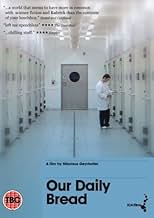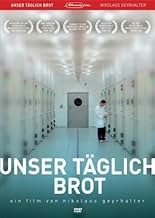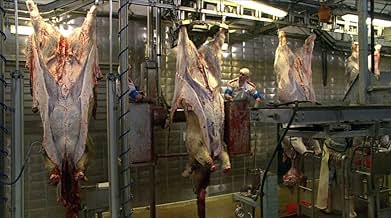IMDb रेटिंग
7.5/10
2.7 हज़ार
आपकी रेटिंग
अपनी भाषा में प्लॉट जोड़ेंOUR DAILY BREAD is a wide-screen tableau of a feast which isn't always easy to digest - and in which we all take part. A pure, meticulous and high-end film experience that enables the audien... सभी पढ़ेंOUR DAILY BREAD is a wide-screen tableau of a feast which isn't always easy to digest - and in which we all take part. A pure, meticulous and high-end film experience that enables the audience to form their own ideas.OUR DAILY BREAD is a wide-screen tableau of a feast which isn't always easy to digest - and in which we all take part. A pure, meticulous and high-end film experience that enables the audience to form their own ideas.
- निर्देशक
- लेखक
- स्टार
- पुरस्कार
- 4 जीत और कुल 5 नामांकन
फ़ीचर्ड समीक्षाएं
The recent film "Fast Food Nation" imposes a fictional narrative onto the factual expose of Eric Schlosser's informative and horrifying book about (among other things) the industrialization of agriculture. The documentary "Our Daily Bread" makes no such concession to its audience's need for story, presenting virtually wordlessly scene after scene of modern food production in action.
It's a cliché at this point to note how modern consumers are alienated from their diets, making no connection between the plastic-wrapped pieces of muscle they purchase in the supermarket and the animals they were once part of. Still, Austrian director Nikolaus Geyrhalter presents dozens of memorable and fascinating images, not all of them of the gross-out variety. In fact, there's even an abstract beauty to some of what we see, at least until we realize it's all part of a vast killing machine.
Difficult to sit through, "Our Daily Bread" is nonetheless an important record, invaluable for those with the courage to watch it.
It's a cliché at this point to note how modern consumers are alienated from their diets, making no connection between the plastic-wrapped pieces of muscle they purchase in the supermarket and the animals they were once part of. Still, Austrian director Nikolaus Geyrhalter presents dozens of memorable and fascinating images, not all of them of the gross-out variety. In fact, there's even an abstract beauty to some of what we see, at least until we realize it's all part of a vast killing machine.
Difficult to sit through, "Our Daily Bread" is nonetheless an important record, invaluable for those with the courage to watch it.
In contrast to the well-meaning but didactic and dry FOOD INC., this documentary explores the process of mass food production without preaching or judgment. Because it is entirely wordless (well, not entirely... we hear some of the workers chatting, but since it's left untranslated, I assume it's the inconsequential small talk it appears to be). While this might make it less informative, the images speak volumes about how cold and impersonal the process is. Machines invented for extremely specific animal-rendering tasks (the "chicken vacuum" is a total mindf*ck), people performing repetitive and methodical jobs, massive facilities crammed with rigidly parceled animals. The cinematography is superb, with framing that is Kubrickian in its sense of scale, depth and symmetry. The film is hypnotic and meditative, giving the viewer room to form his own opinions, to wander down different avenues of thought regarding how we produce and consume food. Geyrhalter is careful not to dehumanize the workers, no matter how inhuman the process is. We often see them hanging out, or enjoying their own meals. Don't hate the playa, hate the game. And one doesn't get the sense is Geyrhalter is merely finger-wagging. Although there are brutally disturbing images (maybe worse than any other slaughterhouse footage I've seen), there is almost an admiration for how efficient these routines are. But again, any conclusions you draw are your own. Will I change my consumption habits? Knowing me, probably not, but it certainly got me thinking about it.
It is great. Not because of the subject or because I'm so interested in the food processing industry.(I'm really not) It is great because it ask and answer some really new things about documentary.
If not new,"different" in the best possible interpretation of the word. No talking, that means no interview or voice over. No editing tricks,just perfect efficient shots, one after the other. Forget the angry guy behind the camera or the microphone who really wants to not only show but persuade you. Forget the radio-documentary, here come the images-documentary. If you liked Depardon's documentary, if you like photography, if you are tired of Mickael Moore, if you don't think you need to be told what to think when you can just see it, there is a movie for you.
Its a lot more than a documentary about food industry as far as I'm concern, its about backing up and trying to get " a bigger picture"
MAc
If not new,"different" in the best possible interpretation of the word. No talking, that means no interview or voice over. No editing tricks,just perfect efficient shots, one after the other. Forget the angry guy behind the camera or the microphone who really wants to not only show but persuade you. Forget the radio-documentary, here come the images-documentary. If you liked Depardon's documentary, if you like photography, if you are tired of Mickael Moore, if you don't think you need to be told what to think when you can just see it, there is a movie for you.
Its a lot more than a documentary about food industry as far as I'm concern, its about backing up and trying to get " a bigger picture"
MAc
This movie didn't show me anything I didn't already know, but it's silence gave me time to think about what is shown. Certainly not a movie for impatient people or after a hard day at work. It left me with a strong feeling: That industrial farming and breeding is just that - industrial. Certainly the slaughterhouse sequences touched me most. Treatment of the animals doesn't appear cruel, but very unnatural. Efficiency and detachment rule. Plants and animals don't grow and live anymore. They are produced and harvested. What's ultimately lost is the variety of life outside the human production-sphere and the human connection to the world.
The quality of the this film, how it focuses on the various aspects of large and highly advanced agricultural processes used in Europe is very interesting and seems to include a great amount of detail in the various processes that result in the meat and vegetables that are destined to show up on people's dinner tables. From feeding beef cattle to harvesting Irish potatoes we get fine quality shots that include so much information both close-up and deep shots. Most of us are so distanced from how our food is produced. Most producers I would imagine don't really want to let us in on what goes on before the products shows up in our market showcase. The candidness of the images that show the operations where the food is grown and processed is great. I bet that few food producers in the U.S would allow such filming in the establishments
क्या आपको पता है
- कनेक्शनReferenced in Film Junk Podcast: Episode 232: Inglourious Basterds (2009)
टॉप पसंद
रेटिंग देने के लिए साइन-इन करें और वैयक्तिकृत सुझावों के लिए वॉचलिस्ट करें
विवरण
बॉक्स ऑफ़िस
- दुनिया भर में सकल
- $71,810
- चलने की अवधि
- 1 घं 32 मि(92 min)
- रंग
- ध्वनि मिश्रण
- पक्ष अनुपात
- 1.85 : 1
इस पेज में योगदान दें
किसी बदलाव का सुझाव दें या अनुपलब्ध कॉन्टेंट जोड़ें




















